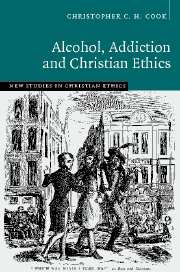Book contents
- Frontmatter
- Contents
- General editor's preface
- Preface
- 1 Alcohol, addiction and Christian ethics: introduction
- 2 An addiction in context: the use, misuse and harmful use of alcohol
- 3 Drunkenness as vice in the New Testament
- 4 Drunkenness as intemperance: Augustine, Aquinas, Luther and Whitefield
- 5 Temperance redefined: the nineteenth-century temperance movement
- 6 Addiction as sin and syndrome: the divided self
- 7 Alcohol, addiction and Christian ethics
- 8 Conclusions
- Bibliography
- Index of Bible references
- Index of names and subjects
6 - Addiction as sin and syndrome: the divided self
Published online by Cambridge University Press: 22 September 2009
- Frontmatter
- Contents
- General editor's preface
- Preface
- 1 Alcohol, addiction and Christian ethics: introduction
- 2 An addiction in context: the use, misuse and harmful use of alcohol
- 3 Drunkenness as vice in the New Testament
- 4 Drunkenness as intemperance: Augustine, Aquinas, Luther and Whitefield
- 5 Temperance redefined: the nineteenth-century temperance movement
- 6 Addiction as sin and syndrome: the divided self
- 7 Alcohol, addiction and Christian ethics
- 8 Conclusions
- Bibliography
- Index of Bible references
- Index of names and subjects
Summary
The aim of this chapter is to reflect theologically upon the concept of addiction with a view to exploring some possibilities for the construction of a theological model of addiction. This is not exactly a proposal for a dialogue between Christian theology and science, but it does presuppose that a kind of conversation can be established between Christian theology and the scientific study of addiction.
Alistair McFadyen has drawn attention to the twin dangers that contemporary theology faces. On the one hand, it is at risk of reducing conversation about God to purely secular terms, such that it has no real contribution to make to the discussion. On the other hand, it is at risk of withdrawing completely from secular discourse about material reality and confining itself to the non-material fields of the spiritual and the moral. Both are perceived by McFadyen as essentially ‘non-Christian’ positions; forms of collusion with the ‘pragmatic atheism’ of secular discourse. For McFadyen, the ‘one possibility by which modern theology may live’ is that it might engage in a critical dialogue with the secular. Thus ‘the business of Christian theology … is to understand both God and reality from the perspective of God's concrete presence and activity in the world, and in relation to our concretely lived experiences of being in the world’. McFadyen proceeds to illustrate this in relation to the doctrine of sin.
- Type
- Chapter
- Information
- Alcohol, Addiction and Christian Ethics , pp. 127 - 170Publisher: Cambridge University PressPrint publication year: 2006



